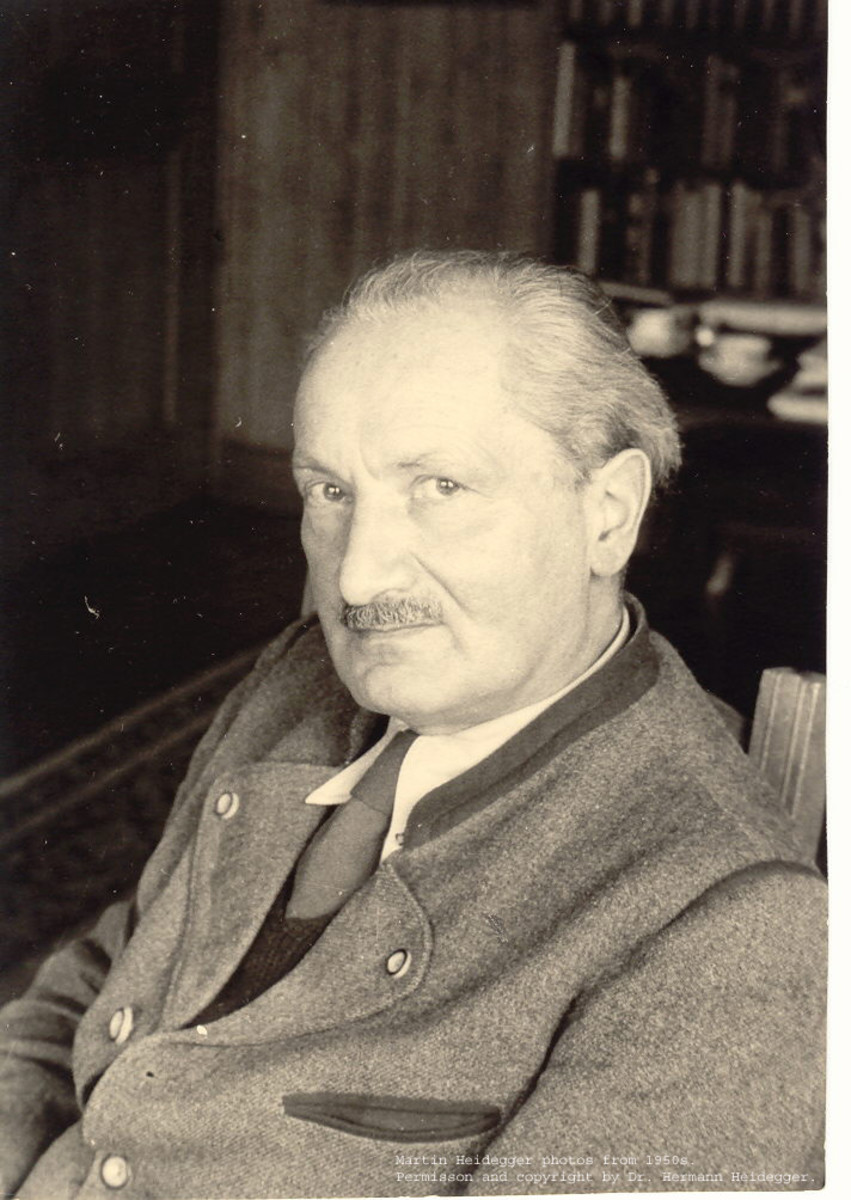Heidegger on Technology
Heidegger Quotes
The darkening of the world, the flight of the gods, the destruction of the earth, the transformation of man into a mass, the hatred and suspicion of everything free and creative, have assumed such proportions throughout the earth that such childish categories as pessimism and optimism have long since become absurd.”
“Only God can save us now.” - Heidegger.

Heidegger views technology, or techne, as ways we interact with our world and how we are in relation to our Being-in-the-world. Being is equal to time, such that, Being is in fact the unfolding of time. A way of revealing and concealing of Being; a way of Becoming. We cannot rationally disect how we live in the world to uncover Being, rather we must let Being be to grasp what is revealed through Dasein.
Heidegger suggests we can connect with Being through the medium of art, poetry and music. I cannot disagree on that point. It does seem that art, music and poetry can uplift our spirits as well as sing to our very essence. It does point to something within ourselves and our being in the world. In much the same way I would vastly prefer to work in an environment, being an office or a city, that is aesthetically pleasing. A place that can uplift rather than smother me with its efficiency and functionality. It is a great loss when we do not surround ourselves with ‘things’ that call to our Being.
Modern technology can cover over Being which then masks and disconnects us from ourselves. There is this idea that the ‘Ego’, thus ranking ourselves over and above all other beings and then the planet is merely there for our consumption. Since the world is there for our pleasure we blinding engage in the destruction of our environment, without understanding it is ‘our home’ and being-in-the-world is a relationship. It is this mindless process Heidegger fears we cannot halt.
According to Heidegger our very nature is to be world disclosers. We have modes of being in the world that reveal true Being. Technology, as with art, are the techne used to bring-forth being. The evolution of technology however has diverged from its original techne mode and here lies both the risk to Dasein and its salvation.
Modern technology has changed from its past manifestations such that the basic revealing essence of technology is instead more of a challenge. A challenge which inflicts on nature the “unreasonable demand that it supply energy that can be extracted and stored as such.” (Krell, p,14). By viewing nature as a resource to be used as we deem fit we begin to collect it for future use. Everything in our environment is reduced to a standing-reserve and thereby losing its reality beyond our own. Our understanding of nature becomes constricted and us more detached from it. As we endlessly limit the essence of natural objects in our environment, we also end up with increasingly limited characters and being. When we limit ourselves to be the orderers of standing reserve we are in danger that we too will become part of that standing reserve.
It is through the process of enflaming that holds the risk of limiting the ways techne reveals. We become the subject, the world the object, as a consequence of Techne’s natural process establishing itself. What happens is that we see the processes of technology becoming more the efficient ordering of our resources, not as objects to satisfy our needs, but simply ordering for the sake of ordering. Hubert Dreyfus suggests the post-modern instrumental world shows evidence of humans becoming part of the standing reserve. We end up with a sort of ‘hyper-reality’ in which we seek stimulators to eradicate the limitations of the real world. Information supervenes the objects in our everyday lives and thus both the person and the thing are s consumed into standing-reserve. Information constantly changes, our objective self becomes equally fluid and by treating everything as standing reserve makes relentless redistribution, re-transformation and distribution for its own sake. Dreyfus suggests the Internet is a fine example because information is literally at our fingertips, we cast off all constrictions of the real would, deny the real world completely sometimes and become merely part of the process. Another bit, or facet, of the information gathering and distribution process. Escaping into the world of video games enables us to live in a fantasy world, denying the real world, and creating a perception of self that is equally fabricated. People can literally lose themselves in this process, being consumed by the unreal and the denial of their own environment and lives. People can lose their core identity, sense of self and essence. As such we can see how sometimes our technology takes us away from our own being. We become intangible fluid creations, taking on many personas, or even completely ignoring our true being. Because we can manifest many facets or personas without the connectivity of our real being there is no need to develop a singe identity cohesively. Without that internal connectivity we are left with no ‘home’ sense or sense of community. A realm where we are increasingly interconnected on the Internet and yet completely disconnected from our local environment. This sense of being grounded in the concept of ‘home’ and being-in-the-world is vital to Heidegger. We are always ‘connected’ every where and any time but losing that awareness of our environment. We become more comfortable conversing on Facebook, at times with ‘friends’ we never have or ever will meet, than real life connections. A disconcerting notion certainly as each younger generation becomes more attached these tools, spewing out information faster and in increasing frequency, downing in information that is often useless and yet falling short of real life interactions, socializations and problems.
Can there be a solution to this pervasive process? Other than just getting down to it and linking our brains directly into our computers and utterly denying the real world? Heidegger’s suggestion is to attempt to ground ourselves, to be ‘at home’ and to set up local worlds to connect within. This is because it is not ‘the world’ there are many worlds of understanding to give ourselves a framework for being in the world. Perhaps this is vital to preventing ourselves from becoming adrift in cyber-space obliterating our sense of self. The manifestation of a local world develops around everyday ‘things’, things that combine their own being with people involved in an activity involving the thing. Things that ground us in our own being and connects us to other beings. As such instead of seeing ourselves as a collection of skills, or facets of our personality, we become flexibly connected to the technology. Therefore, we must find objects that do not only meet our desires, or to have for the sake of having, but help us develop ourselves to new methods of being ourselves. Rather than confining, limiting or fracturing our sense of selves we would instead be exploring new ways to manifest ourselves in the world. In could be a matter of presenting ourselves authentically on the web, gathering all aspects of ourselves into a cohesive identity we seek to develop, commutate and share with others. While it might be seen that such social media as Facebook contribute to our disconnected and multi-persona selves, it could also be seen as a tool to gather all aspects of ourselves into one community to share with others in a way not at all possible in the real world. Something that connects ourselves as well as others together. And, video games that can lead to the denial of the real world can also be used as a way of gathering friends and family in one place to interact together. We can see how these two examples can cause us to conceal ourselves, but can also create that sense of ‘home’ depending on how we interact and relate to that technology.
Now while it it good to ground our being and create a cohesive sense of self we do not want to limit ourselves to just one mode of interaction. Technological devices may make us see a collection of skill sets, rather an having one unified identity. As we are disclosers of worlds devices may reveal one sort of ‘world’ among others. So in fact the saving power that Heidegger sees is not have a fixed identity and rather being open to experiences multiple identities, which then disclose multiple worlds. What did I just contradict myself? Interacting with technology in a way that unifies our identity but then also allows us to display multiple identities? It really is a matter of how we interact with that technology. We can see ourselves as a whole person, but one that engages with different technologies in different ways disclosing different worlds. Technology can fragment or enable us to deny our sense of self, or deconstructs us into skill sets… or it can collect us together, help us define ourselves and give us a more complete being, interacting with other beings. The saving power is exploring possibilities that collect us into those ‘local worlds’, into different and new worlds of meaning we manifest that let ‘things thing’, as we let ‘being be’.
The average human does not often ponder things in themselves nor do we usually see everything as a resource. Yet there is the danger of it. Being open to considering things in themselves can help make decisions to how we relate to the thing, or when to use the thing, then people can prevents seeing themselves as standing reserve.
Freedberg states “Technical choices establish the horizons of daily life. These choices define a ‘world’ within which the specific alternatives we thing of as purposes, goals, uses, emerge. They also define the subject we chooses among the alternatives: we make ourselves in making the world through technology.”
Art has a component in our saving power of technology. Since art is also a process of brining-forth. A process that helps us see the truth in the things. We see instruments and devises in the usefulness, effectiveness and reliability, but art helps the being of the thing come to the surface. Artwork then plays a certain role to ensure we open our mind beyond our defined viewing of things. A necessary reflection set to open up a world where things are not limited to their functions and their uses but also for the essence. The world of displaying a thing in its true nature as part of our world, as Dasein is a relation from beings to beings. Artwork is not merely senseless creation or revealing as it can severe as a venue to our reflection on our technology.
Conclusion & Notes
For Heidegger there is no issue with technology in-itself but how is nature is revealed. Our saving grace to prevent the lose of self is to change our relation to technology. Technological ordering can restrict our veiw of our enviroment. This mode of techne revealing itself is nota problem, but it can becomes a limiting one when it covers over being and alienates us. On the level of society change would be problamatic because it is fixed in the enframing process. However on a personal level we can redefine how we interact with technology; a way of manifesting local worlds that disclose different meanings and open us to new ways of becomming in our flexsible social world, if we do not lose ourselves in the process.
Notes:
Dreyfus, Hubert Highway Bridges and Feasts: Heidegger and Boremann on How to Affirm Technology
Feenberg, Andrew Hiedegger, Habermas, and the Essence of Technology
Krell, David Martin Heidegger: Basic Writings 1972









